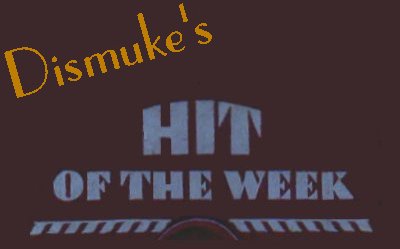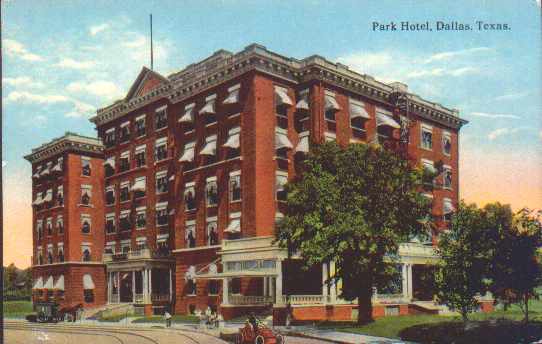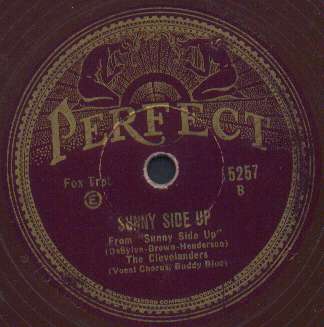

February 2003
February 27, 2003
This week's Hit of the Week is brought
to you by

Park Hotel, Dallas, Texas
(from 1913 postcard)
That's
How I Need You - Medley
Victor Military Band
1913
(Victor 17325-B)
I rarely feature popular waltz recordings
- though a great many were issued by most of the popular bands up through
the 1920s. I also tend to neglect recordings from the acoustical
(pre-microphone) era. This week's selection - a medley of two songs
- should help make up on both counts. The first song, "That's
How I Need You," was composed in 1912 by Al Piantadosi and
was first performed by vaudeville star Ema
Carus, who, a year earlier, introduced Irving Berlin's first
big hit "Alexander's Ragtime Band." The song was revived in the 1950
Jane Powell/Ricardo Montalban film Two Weeks With Love. The
second song in the medley, "Billy, Bounce Your Baby Doll" composed by Fred
Fischer and Al Bryan, was introduced in 1912 by Al Jolson at New York's
Winter Garden Theatre.
February 20, 2003
This week's Hit of the Week is brought
to you by

The Scott Paper Company
(from circa 1927 ad)
Its
A Happy Old World After All
Park Lane Orchestra
Vaughn DeLeath, vocal
1927
(Brunswick 3487-B)
"Park Lane Orchestra" was a recording
pseudonym used by the Harry Reser band. Reser, one of the top banjo
players of his day, was an extremely prolific recording artist. During
the 1920s and 1930s, Reser's band recorded under dozens of pseudonyms on
a variety of labels. In 1926 he became one of the early pioneers
of network radio when his band secured its own nationwide half hour program
over the fledgling NBC network under the sponsorship of the Clicquot
Club brand of soda pop beverages. The "Clicquot Club Eskimos" became
an immediate hit and remained on the air for a decade. The
program featured upbeat music with a heavy emphasis on Reser's guitar playing.
The Reser band was also well known
for the large number of novelty tunes that it recorded under pseudonyms
such as "Reser's Jazz Pilots" and "The Six Jumping Jacks."
Based on the handful of "Park Lane
Orchestra" records that I have in my collection, Reser's trademark
guitar playing seems to have been absent from recordings made using that
pseudonym.
The vocalist on this recording,
Vaughn DeLeath was another radio pioneer . A 1920 performance over
the experimental wireless telephone station of inventor Dr. Lee DeForrest
made DeLeath's the first singing voice to be heard over the brand new medium
and earned her the title of "The First Lady of Radio." When
vocalist Kate Smith started billing herself as "The First Lady of the Radio,"
DeLeath sued and was successful in winning an injunction that forced Smith
to stop using the title. In the early 1930s, DeLeath participated
in experimental broadcasts for yet another new medium: television.
February 13, 2003
This week's Hit of the Week is brought
to you by

WORTH HOTEL
Fort Worth, Texas
300 Rooms with Tubs, Shower Baths and running
Ice Water.
Lobby, 200 Guest Rooms and all Public Rooms Air-Conditioned.
SENSIBLE RATES
(from circa 1930s postcard)

Sunny
Side Up
The Clevelanders
1930
Buddy Blue, vocal
(Perfect 5257-B)
This week's selection is the title
song from the 1929 movie musical Sunny Side Up which starred
Janet Gaynor and Charles Farell. Other very successful songs from
the film included "I'm A Dreamer, Aren't We All?" "Turn On The Heat" and
"If I Had A Talking Picture of You." All of the songs, including
other versions of "Sunny Side Up," have been featured elsewhere on this
website.
The old orange colored Perfect disc
that this comes from is not in especially great condition - but I think
my audio restoration software did a decent job of cleaning it up.
Unfortunately, there was nothing the software could do to fix the very
brief skip that you can hear about 38 seconds into the recording.
I know that "The Clevelanders" was
a recording pseudonym used by both the Harry Reser and Phil Spitalny bands
and perhaps others as well. But I do not have any specific information
on exactly whose band is featured on this recording. If anyone
out there has that information, drop me an email
and I will post it on next week's update.
"Buddy Blue" is actually vocalist
Smith Ballew who used that pseudonym on a number of records with several
different bands. Ballew's vocals were very prominent on dance band
records for various "dime store" labels during the early Depression years.
He also fronted his own dance band. By the late 1930's Ballew
had pretty much abandoned the band business in favor of a career in Hollywood
where he was the star of several B Western "singing cowboy" movies.
In the 1950s he retired from show business altogether and moved to Fort
Worth, Texas where he worked as an engineer at the General Dynamics (now
Lockheed-Martin) plant.
February 6, 2003
This week's Hit of the Week is brought
to you by

(from 1925 ad)
What
Do I Care? - Medley
International Novelty Orchestra
1926
(Victor 19929-B)
This selection comes from the Sigmund
Romberg operetta Princess Flavia which opened at New York's Century
Theatre on November 2, 1925. Hungarian born composer Romburg is best
remembered for other Broadway operettas such as The Student Prince in
Old Heidelberg, The Desert Song and The New Moon.
About a minute and a half into the recording, another tune from Princess
Flavia, "Twilight Voices" can be heard.
The International Novelty Orchestra
was an in-house studio orchestra for the Victor Talking Machine Company
led by Nat Shilkret.

|


